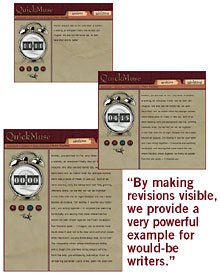Poetry in Motion: The Mystery of Creativity, Unraveled
QuickMuse.com shows the creative-writing process as it unfolds.

The Internet flattens the intellectual geography of the world. It can transport a young girl from Topeka, Kansas, to the Louvre and then connect her to a classroom of students from nearly every continent. In merely two decades, six degrees of separation has evolved to one login and a click.
This connection revolution has put a bright new face on teaching. Collections of great art or the riches of classical music are now accessible to any classroom connected to the Web. But accessibility is not necessarily comprehension; for that, teachers must still find ways to explain the mysteries of creativity. For a visual generation, the appreciation of art is not unteachable, and music, though more difficult to deconstruct, can also be dissected by a dedicated teacher able to explain, say, the mathematical structure of a Bach fugue. But there may be no art form more perplexing, and less yielding in an anatomy lesson, than poetry. Even the ability of the Internet to unlock secrets would seem inadequate to demystify the poetic process.
Enter QuickMuse.com, the brainchild of Ken Gordon. Gordon's original idea, which he says was first sketched out on a paper towel, was to capture the poet's creative process online for the world to see and to add an element of improvisation to the procedure. To accomplish this, he employed a clever piece of technology devised by a Web wizard named Fletcher Moore. Gordon, editor of the Web magazine JBooks.com and a freelance writer for such publications as Salon, the Boston Globe Magazine, and the New York Times, and software programmer Moore say they've come to realize the tremendous capability of the site as an educational tool.
The remarkable site pits prominent poets such as Robert Pinsky, Charles Bernstein, and Mary Jo Salter against one other and the clock in what Gordon calls an agon, from the ancient Greek word meaning "contest" or "challenge." In an exercise of literary improvisation, two poets are given a topic, a quote, a picture, or some other prompt and then have fifteen minutes to compose a poem. The process is recorded and posted online using a "poematic system," a keystroke-logging program similar to those that more nefarious characters have used to steal credit card numbers off the Internet.
Although it seems like a contest, there is no final winner. "There is some element of competition," Gordon says, "and a poet is always in competition with what he has written before. But it's a mistake to view QuickMuse as a win-or-lose situation. Instead, we'd like students to look at the site and think, 'If these famous writers can be so open and brave with their writing, maybe I can do the same.'"
The site also vividly illustrates the malleability of language. "Any poet knows how much revision goes into a piece, but the nonprofessional, the sixteen-year-old in the classroom, has no idea," says Gordon. "This site really shows revision in its most elemental state. By making that visible, we are providing a very powerful example for would-be writers."
The resulting "main event" is archived on the site and can be played back, giving students (including aspiring young poets) the rare chance to look over the poet's shoulder as the work takes shape. Typos, deletions, meanderings, and musings made during the fifteen-minute period are all tracked for the onlooker. (The time span can be sped up for those fidgety kids to whom a quarter of an hour is an eternity.) QuickMuse cleverly modernizes that private bower from which William Wordsworth's poetry emerged as "emotions recollected in tranquility."
More than twenty examples of this poetic pugilism are archived on the site so far. "Because of Moore's original piece of software, the site lets you get to the heart of the creative act and really allows you to see what goes on in the minds of poets as they work," Gordon says. "We are supposed to bow before great poetry; that's the way it's been taught. There's something about our site that makes poems a little less imperious and a little more accessible."
Damien B. M. English is a writer in San Francisco.
Home Pages for Poets
American Life in Poetry
Provides a free weekly column featuring contemporary American poems.
The Favorite Poem Project
Seeks to improve poetry's place in American classrooms by encouraging active, engaging poetry lessons that emphasize a direct, vocal connection to poems.
Poets House
A literary center and poetry archive -- a collection and meeting place that invites poets and the public to step into the living tradition of poetry. At the heart of the organization is a 45,000-volume poetry collection. Free and open to the public, the library includes books, journals, chapbooks, audio, video, and electronic media. It is the most comprehensive open-access collection of poetry books in the United States.
Poetry
A resource of poetry lesson plans for grades 1-8 from Scholastic.
Poetry Daily
An anthology of contemporary poetry that each day brings visitors a new poem from current books, magazines, and journals. Poems are chosen from the work of a wide variety of poets published in the English language.
The Poetry Archive
An online collection of poets reading their work. One can listen, free of charge, to the voices of contemporary English-language poets, as well as poets from the past.